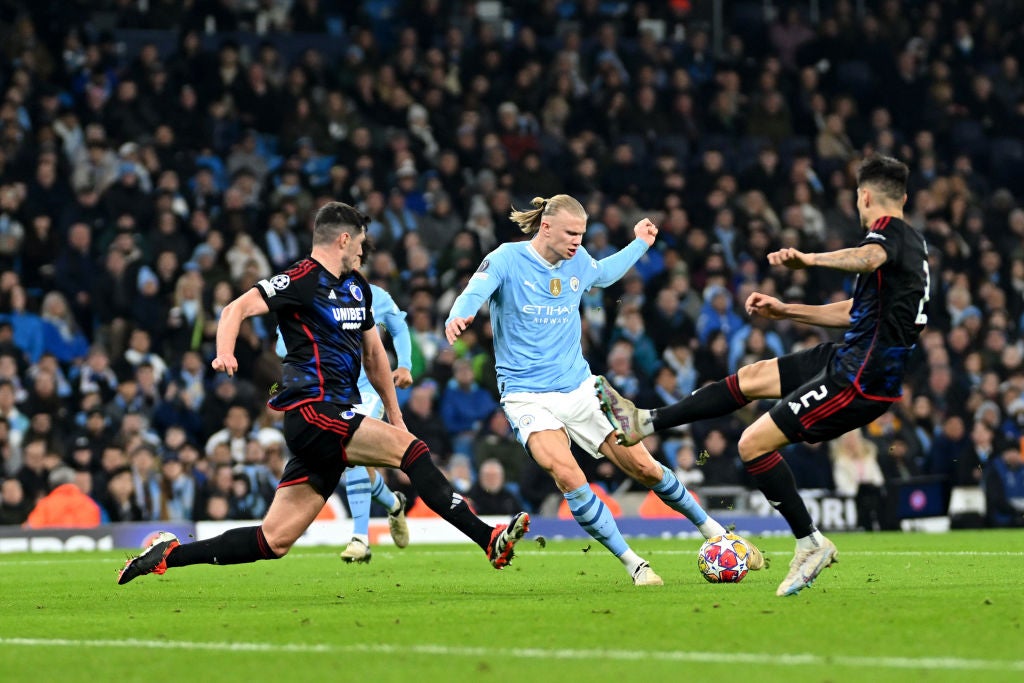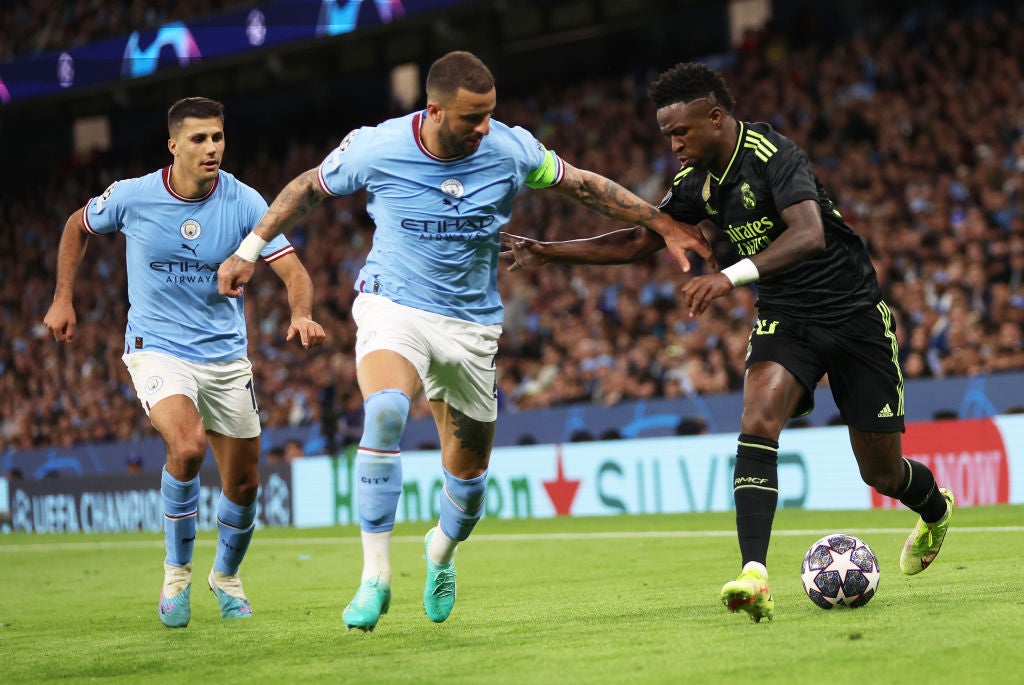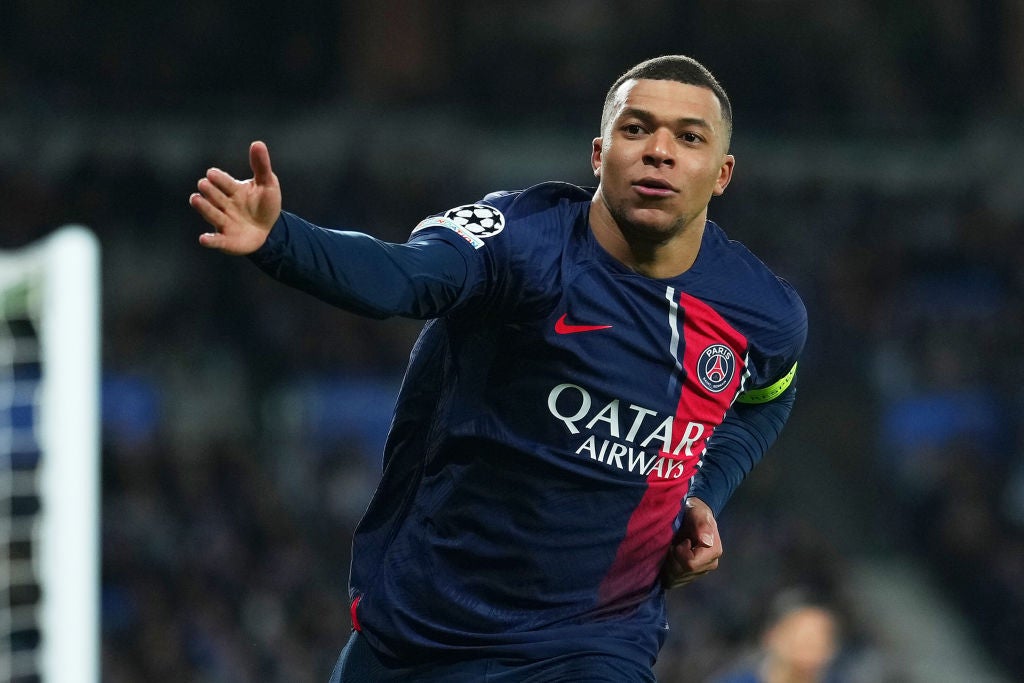The Champions League has gone stale and is past the point of no return
This week’s dull knockout ties showed the direction elite football has been heading towards for some time, writes Miguel Delaney


Your support helps us to tell the story
From reproductive rights to climate change to Big Tech, The Independent is on the ground when the story is developing. Whether it's investigating the financials of Elon Musk's pro-Trump PAC or producing our latest documentary, 'The A Word', which shines a light on the American women fighting for reproductive rights, we know how important it is to parse out the facts from the messaging.
At such a critical moment in US history, we need reporters on the ground. Your donation allows us to keep sending journalists to speak to both sides of the story.
The Independent is trusted by Americans across the entire political spectrum. And unlike many other quality news outlets, we choose not to lock Americans out of our reporting and analysis with paywalls. We believe quality journalism should be available to everyone, paid for by those who can afford it.
Your support makes all the difference.If the Champions League this week left you feeling bored - and that's if you were even watching in the first place - it wasn’t quite the sentiment being shared within Uefa.
There is excitement at the fact the quarter-finals is now close to having one club from each of its major TV markets: that's England, Spain, Germany and France, with Italy still able to make it five from five. This, in the words of Uefa insiders, is much more important than actually competitive and compelling ties.
It is a motivation that explains how the competition has gone so stale, as well as how the wider European football landscape has completely stagnated. The Champions League is only becoming as predictable as many domestic leagues. Profit has been prioritised over the health of the game, leading to growing financial disparities that are now beginning to existentially threaten the sport’s lifeblood of unpredictability.
Put bluntly, the immense money the game generates goes to too few places, meaning it almost becomes irrelevant what it earns other than how damaging it becomes. Uefa president Aleksander Ceferin argued during the Super League crisis that up to 90 per cent of the confederation’s money goes around the game but this is described as a fantasy by insiders. You only have to look at the long-term figures.
In the 26 years between the Champions League’s 1992 founding and 2018, over a third of the €17.3bn prize money went to just 12 clubs. They were of course all of the Super League clubs, gradually gerrymandering this situation where many historic clubs - let alone the great surprise revelations of the past - simply couldn’t keep exciting teams together.
Bayern Munich-Lazio, as one example, was dull because of the knowledge Maurizio Sarri’s stretched team was about the best the 1999-2000 Serie A winners could be: a shadow.
As an illustration of how this works, in the Super League season of 2020-21, both Chelsea and Leicester City were going for the last Champions League spot in England. The prize money regulations meant that, based on historic performance, Chelsea were guaranteed at least €30m for qualifying. Leicester were guaranteed just €1.5m.
This is a new phenomenon.
Many will of course respond by pointing to relatively recent phenomenal games, such as the two incredible comebacks in the 2018-19 semi-finals. The Champions League did seem to hit a dramatic peak at that point. It was a direct consequence of a group of major clubs being able to build the highest-quality squads the game had ever seen, and then colliding against each other in high-quality matches.
They were a direct result of concentration of resources. The problem with concentration, however, is that it only goes one way. It was already being argued in 2019 that the Champions League was a split competition, between dull group stage and exciting knock-outs, with that simply reflecting a financial split in the competition between the super clubs and the rest.

That process of concentration, going on for 30 years, just reached a tipping point. The peak began to topple over. Concentration went too far. That summer saw Real Madrid spend over €100m on a 28-year-old Eden Hazard and Barcelona over €120m on a 28-year-old Antoine Griezmann.
The pandemic then arrived to expose and exacerbate these infrastructural financial problems. It is little wonder the circumstances have left this split in the Champions League, and prompted the Super League.
It was of course the wrong solution. The lesson of the last 30 years is football repeatedly making the wrong choice for the future of the game.
Next season's Swiss system is along the same lines. It doesn’t solve any problems. It simply sidesteps them. The group stage got boring so they got rid of it. There were too many dead rubbers so they staggered the matches. It won’t solve the encroachment of this financial disparity into the knock-out stages.
Uefa has failed its primary mission by overseeing this landscape. Driven by the big clubs, over half of the European football market’s entire revenue was appropriated by seven urban areas: England’s northwest, London, Madrid, northern Italy, Munich, Barcelona and Paris.

There might belatedly be some cause for hope, although it can already be seen that it won’t come without considerable pushback and pain.
Many are already making the superficial link between a stale elite level that no one can break into and Profit and Sustainability Rules (PSR) restricting ambitious clubs. This is the wrong way to look at it, as the new rules are arguably the first positive step Uefa have made in some time.
It might just take a while to see.
For now, the reason we are in the situation we are in is because of an accelerated wage race that has proven the ruination of competitiveness. It is why control is vital.
The best player in the world, Kylian Mbappe, is the ultimate example. All of the major Premier League clubs have looked into buying him but none can make it work due to PSR. This is seen as a great waste and a shame by those agitating for change. The problem here, however, is not the rules.
The only reason Mbappe’s wages are so farcically high is because they have been turbocharged by Qatar. That isn’t evidence of a sustainable game, which is what football needs to move towards.

It is just going to take difficulty. Amid that difficulty, nobody ever considers the alternative. Without cost control, autocracies and private equity could just spend what they want and everyone else would bankrupt themselves trying to compete. It wouldn’t just be that there’d be no competition, there’d be no clubs.
This is also where Uefa have to be much more proactive than just bringing in a different competition.
Cost controls must be complemented by redistribution rules. It is the only way to start re-ordering European football. There is a historical irony there, too. So many now say the old foreign player rule would solve the game’s problems at a stroke because it would instantly spread out talent much more, making the game more competitive. European law on freedom movement doesn’t allow that, but there are alternative solutions.
It was warned on these pages in previewing the Champions League knock-outs that, if fans have any sense that results are in some way predetermined, even subconsciously, the less they’re interested. That perception is poison for a sport.
That is what is happening to the Champions League. That may well make it moot if the big TV markets are involved are not.
Uefa need to start thinking much bigger than that.



Join our commenting forum
Join thought-provoking conversations, follow other Independent readers and see their replies
Comments